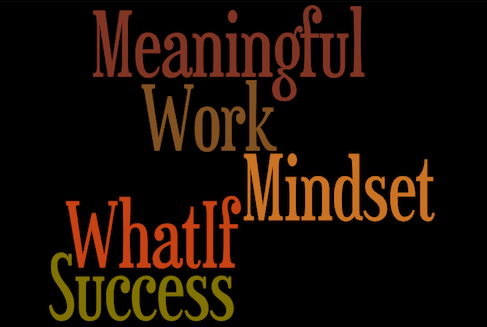Your Move Up the Corporate Ladder: All In Your Head
 Today is a discussion on how you think about your work and I’ll explain why this is so crucial to your success.
Today is a discussion on how you think about your work and I’ll explain why this is so crucial to your success.
When I was going through my 12-year corporate career, I never realized how quickly my idea of work morphed into something unrecognizable, similar to the way The Incredible Hulk (a superhero movie, best analogy I could come up with) emerges out of poor little Bruce when he gets a little too angry too quickly.
Except The Hulk was out to destroy the world in his anger and frustration and my new and unrecognizable definition of work, well, that was just out to destroy me and, you guessed it, my career.
Do you know what I mean? (For your sake, I actually hope you don’t.)
My idea of work was this mundane, meaningless, compulsory set of tasks that I loathed. And you know the worst mistake here? I was under the impression that I could fool everyone at the office into thinking that I actually liked my job. Yes, and I would also like to advance my career, while we are at it.
You see how everything is connected? How you think about your work shows on the outside – you can’t hide it.
In my case, I stopped thinking about the meaning behind the work; it all became about the doing. Some corporate initiatives and projects leave us wanting more, I don’t deny that, but here’s the thing. If you look behind the surface, if you think big picture, you start to see the reason behind why your company wants you to do that work and you start to appreciate the work more. Find those dots and start to connect them. And hang out with me as I reveal more and more ways to help you connect them!
So remember, how you think about your work actually tells your management a lot about you and can position you well as you move up the corporate ladder.
We all want to do good work, even great work. We want to make a difference, so remember that and resist the rut that could sneak up on you.
Whenever I would hear stories about how people give up lucrative positions to do meaningful work, I was baffled. Who gives up all that money and security to go do “meaningful” work? What does it matter what kind of work we do as long as it pays well?
Two big results of thinking positively about your work:
1. You will be happier, healthier and more motivated in the long-term as a person. Therefore, you will attract more success.
2. Your management will notice that you care and keep a good eye on you and eventually help you move up the corporate ladder.
So I ask you then, what is the meaning behind all your wonderful toil? Ask yourself, are you doing your work simply because:
1. Someone asked you to do it?
2. You are expected to do it?
3. You can’t think of what else you would be doing if you didn’t do it?
4. All of the above?
The answers will surprise you. Take your time to arrive at these answers. Write them down. Revisit them later until you are happy with your answers.
Work and Success Are Not Linear Equations
I used to think very linearly about work and success. It went like this: Education, higher education, respectable work, certifications, promotions, awards, more certifications, more promotions, and repeating the cycle. Turns out success at corporate is not so linear. Who knew? I’ve learned a lot since then, and some of your big lessons are coming after we get the mindset right so be sure to stick with these strategies until the very end.
And that worked brilliantly until one day it kinda dismantled. I felt like I was just following a phantom, an illusion of success, all because I didn’t pay attention to the way I thought about my work. I want to spare you the rude awakening down the road. Care about your work and the meaning behind it. It feeds your future success.
Here’s a super quick question to help you think differently about your work: Start by questions to see things in a new light:
Ask questions that start with What If.
For instance, what if you saw your work through the eyes of your upper management?
What if you saw your work through the view of your best customers?
What if you believed more in the project? What if your boss had a good point?
What if your company does have a good reason behind that decision?
What if your job really makes a difference?
Ask at least 10 “What If” questions specific to yourself and your own situation and get your mind thinking in this realm about your work. Come up with answers that help you feel good about what you do and all that you contribute.
